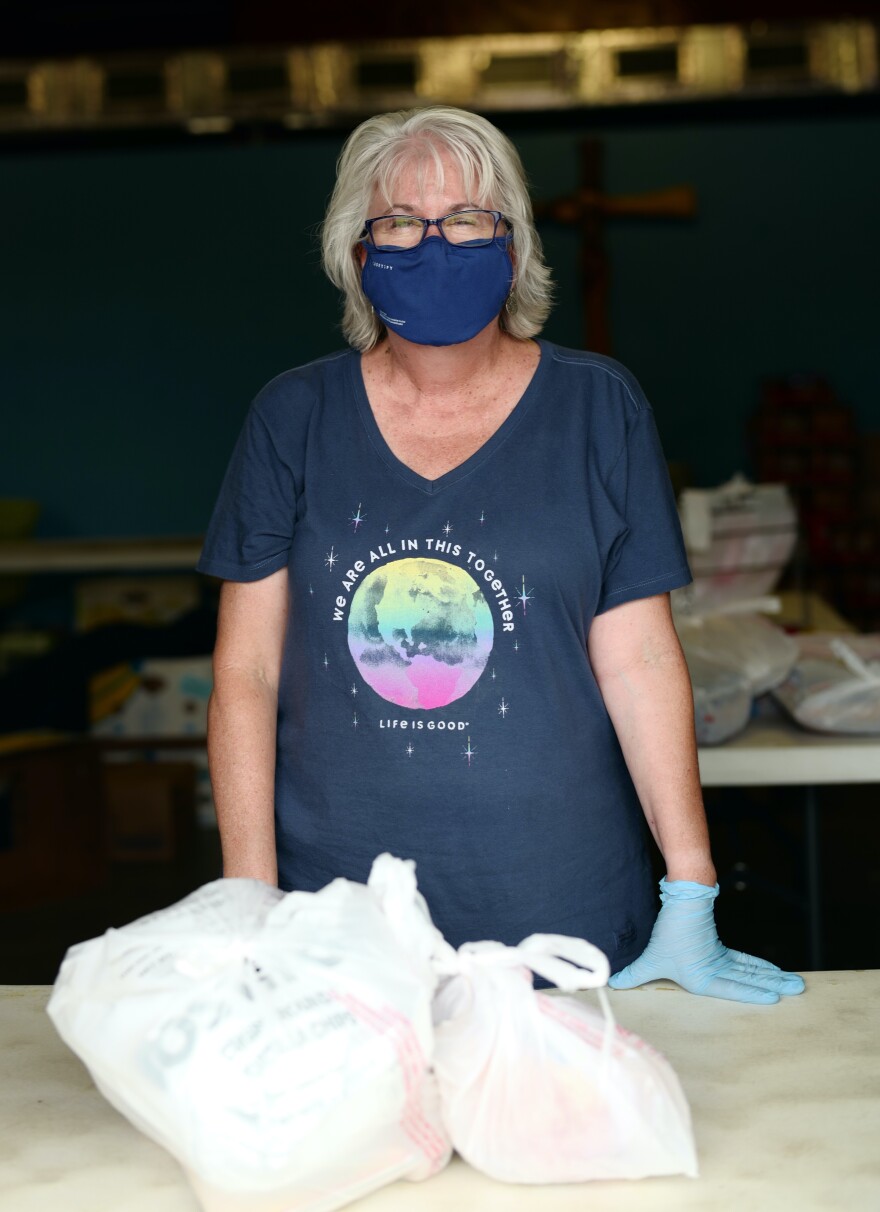With a smoldering sage bundle in her hand, Lupita Vazquez-Reyes pointed out the Chia plant.
“The chia plant has a Mayan origin and is a big part of the cuisine...” she trailed off as she found her footing among the epazote plants. Born and raised in Immokalee, she’s now the Community Outreach Assistant at Cultivating Abundance, where a garden yields produce not normally found in stores, but which is prolific in the native countries of many of the town’s inhabitants.
“Both my parents were farm workers,” Vazquez-Reyes says, “and we were also migrant farmworkers- we moved around a lot and there was a lot of poverty. You know we had government assistance when we were growing up and there was a lot of poverty,” Vazquez-Reyes said.
But her dad had a green thumb, so the family always grew chiles and tomatoes, and had fruit trees.
“We’re sitting here under the gazebo and this essentially is our processing and harvesting. We take in the harvest here as people are collecting what we have in the garden. It all comes here you see little piles and buckets full of greens. We start weighing them, we bag them up. This is our processing,” said Vazquez-Reyes.
The garden is in the lot behind Mission Pineal where the weekly food distribution through the Harry Chapin Food Bank and other charities is now supplemented with fresh organic greens from the garden.
The idea started with Rick and Ellen Burnette, who’d worked for 19 years on the Thai/Burma border with migrant workers they say are similar to the people of Immokalee, from many different countries just seeking a place to be safe and work for a new opportunity. As soon as they landed in Southwest Florida they set up their own garden.
“Kind of a small farm on about a third of an acre. And we were quickly producing more produce than we could eat, and neighbors did not want all of what we were producing, and friends. And we thought, you know there may be an opportunity here. Surely there are people who would be an avenue to share the abundance,” said Rick Burnette.
Vazquez Reyes says it’s been an obvious success. People quickly hop out of the usual line to get their hands on the distribution of these greens.
“They’re opening the bags, they’re going through them you know they’re being curious to see what they have, they might be trading things they might not be wanting, if they have too much of something. But we never see them, it’s very rare to see any of that dumped, any of the greens dumped. So we know they’re being used in the community,” Vazquez-Reyes said.
The selection of the plantings is purposeful, to reflect the familiar tastes and ingredients people in the community are often surprised, and quite happy to find.
For example, Ellen Burnett who co-founded the garden recalls the day some tropical yams indiginous to Central America, the Caribbean, Africa and Asia recently appeared at the produce line. She’d never seen such a huge tuber.
“So we had them in a cooler outside the doors and you’d think people would walk by and see this weird stuff and just wonder what in the world and walk away. But people were just going nuts over it. Someone had to stand there and say ‘just take one piece.’ And they were picking it up and raising it over their head like ‘yay!’ Nobody was asking ‘What is this?’” Burnette said.
Vazquez-Reyes says a taste of home can feel like a victory.
“As a farmworker, when we were younger, being a migrant family, you almost lose a connection to the land because your body’s not yours. You’re just a slave to the work because you have to work so fast. You have to pick fast enough, you have to be to work every day. There's no humanness of it and that's why you see a lot of our workers. I remember my family working super hard and then when we were home, playing really hard and enjoying our time together. Because that cultural aspect just really reminded us of being human,” Vazquez-Reyes said.
Rick Burnette said that’s why each plant in this garden is intentional and informed by the community it is helping to feed. “In this garden we have things that have come from our neighborhood and beyond- which would be the crops that people miss and want to grow, the chipoline, the plantain bananas, the quelites, and so many other things,” said Burnette.
Quelites is a derivation of Nahuatl word for the leafy greens of amaranth, the grain Aztecs relied on until Cortez infamously outlawed it under penalty of death and set fire to the crops as the Spanish invaded the land.
More than a grain, those tender green leaves of the quelites are prepared as one would any green, and specific types vary from region to region.
Miguel Estrada is the Pastor at Mission Peniel, and he says being from Guatemala he was often frustrated when he’d finally find an ingredient from home, and it just didn’t measure up. That’s why he’s so thankful to be able to provide fresh, organic, and culturally relevant staples.
“Flavor is really really attached with people’s culture. Wherever you come from, flavors can bring back to your heart and to your mind and to your stomach everything that home means. This is the really meaningful thing about this. Having this garden and this opportunity to grow what people not just like it in the way of tasting, but people enjoy it in the way of making their soul happy and feel a little bit home when they are too far away,” Estrada said.
Copyright 2021 WGCU. To see more, visit WGCU. 9(MDAyNDY5MjM1MDEyODE2MzMyMTZmZDQwMg001))









